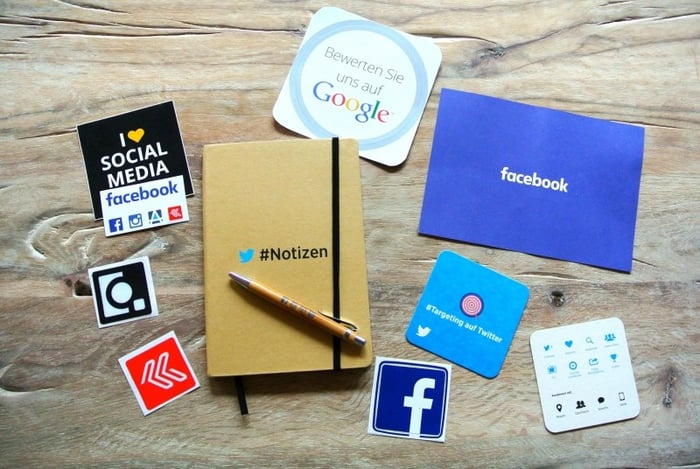When it comes to digital marketing, it can be hard to get your head around.
The commercial version of the Internet is only a couple of decades old, and yet we are witnessing an unprecedented profusion of customer approaches tied directly or indirectly to digital!
A buzz, geolocation, cloud: these terms didn't make the slightest sense to marketers twenty years ago. Yet they are unavoidable today.
To help you navigate the jungle of 21st century marketing terminology, here's a non-exhaustive list of new ways to prepare for the Business Relationship 2.0 !
1 - Affinity Marketing
Affinity Marketing is about forming partnerships between organizations or between brands to reach a wider audience. Historically, this approach is found tremendously in the Banking and Insurance sectors for credit guarantees, for example.
This practice has grown considerably with the advent of digital, especially for joint promotions of online software.
Targeting the same Buyer Personas, this practice can help to mutualize some of the costs of producing content in Inbound Marketing.
2 - Buzz Marketing
Ahh the famous "buzz": This word that makes marketers dream and that makes communicators shudder when it becomes "bad".
It comes from the English word meaning "humming" (which can quickly become annoying).
The Buzz Marketing relies on the consumer becoming a media outlet themselves when they republish original company content (advertisement, commercial event, contest, product, etc.)
While Buzz Marketing has exploded with the arrival of social networks, it remains to be handled with care and intelligence: internet users hardly like to feel manipulated to participate in a commercial promotion.
The undisputed master of Buzz Marketing is the Austrian company Red Bull.
3 - Cloud Marketing
At first glance, it could be something very poetic: "Cloud" Marketing! In truth, it is very prosaically about using decentralized services or technologies.
The goal is to use advertising methods aimed at targeting customers on online applications via social media and various portals. The advantage? Information is passed from user to user, so it doesn't feel like an advertising message.
Despite these benefits, the cloud can be complex and also result in disadvantages , namely safety and security issues as well as technical glitches.

4 - Content Marketing
If you are a regular reader of our blog, this term should hold no secrets for you anymore!
Also known as Content marketing, it is more commonly referred to by the English term. It aims to provide prospects/customers with quality content (blogs, webinars, white papers, infographics, video, etc.) to increase the visibility of a brand and customer engagement with it.
It is one of the most effective Marketing approaches today, particularly because customers are spending more and more time learning about products, services and brands on the Internet before they buy.
Brand Marketing is often associated with Content Marketing, even though it is more often oriented towards a sponsorship logic.
5 - Conversion Marketing
Conversion Marketing Conversion Marketing refers to an approach that bets everything to encourage visitors to complete a specific action It's all about hooking (sometimes referred to as Hook Marketing) visitors, sometimes at the expense of content quality.
It is widely used on gaming, illegal downloading and pornographic sites. Yet more and more sites - e-commerce sites in particular - are using it to optimize their buying process.
Some very effective techniques such as call-to-action (like the one below) or the commercial use of animated gif, come from this strategy.
6 - Consumer-Generated Marketing
Thanks to viral actions, Consumer-Generated Marketing, often called UGC (User Generated Content) Marketing allows you to promote a brand or products using consumers or prospects as broadcasting lever. It relies heavily on social networks and requires perfect responsiveness.
Complicated to set up, it allows for spectacular results as in these some examples.
7 - Data-driven Marketing
The term literally means "data-driven marketing."
This approach indeed uses data associated with Buyer Personas for example for site personalization or programmatic advertising. It can also use external environment data to contextualize a message such as weather, geographic, open data, etc.
Combined with Big Data, this strategy can be very effective even if a "humanized" approach is still essential.
8 - Geomarketing
This is a corollary of the previous definition:
Geomarketing is based on the notion of space, particularly through the management, representation (often cartographic) and understanding and analysis of sociodemographic, economic or behavioral data of populations in a defined area, in order to improve commercial management.
This strategy is getting a new boost thanks to the ability to >track customers' movements via their smartphone interactions.
9 - Green Marketing
"Green" Marketing is essentially about emphasizing the ecologicalnature of products and services. Communication is also done via forums and sites devoted exclusively or partially to the defense of the environment.
Beware, however, of the backlash if the company is not totally virtuous in this area. We remember BP's calamitous communication around the "Beyond Petroleum" after the Deepwater Horizon oil rig explosion.

10 - Guerilla Marketing
Some would like to believe that Guerrilla Marketing is about going out and sabotaging the efforts of competitors!
Guerrilla Marketing is actually a term that reflects a current trend in a deviation dfrom traditional marketing to what is now called Alternative Marketing (Buzz, Viral, Guerilla, street...). It is about getting off the beaten track of Marketing to get maximum results with few resources.
11 - Inbound Marketing
This is THE big innovation in Digital Marketing in recent years.
The Super Agency, like dozens of other players in the Digital Marketing market, are constantly promoting this approach to Marketing, invented 10 years ago by publisher Hubspot.
Let's be clear: the Inbound Marketing may not be a total revolution. But it is an ultra-efficient approach that encompasses (in a holistic way say the Anglo-Saxons) the best practices of contemporary Marketing.
It is essentially characterized by the use of upstream content to attract visitors, conversion techniques (CRO) to generate sales leads, of Marketing Automation tools to nurture (nurturing) the leads, to ultimately turn them into customers.
It is currently Marketing (excluding unconventional techniques) that offers the best return on investment (ROI).
12 - Influencer Marketing
Influence Marketing involves using recommendations from people with authority in a field, who are called opinion leaders.
Originally, Influencer Marketing was mostly geared towards active members of online communities or forums. Today, it concerns mostly the most (re)known bloggers on a topic, as well as some users of popular social networks like Facebook, Youtube or Instagram.

13 - In-game Marketing
In-game Marketing refers to all promotional insertion actions within a video game, whether connected or not.
It allows advertisers to pay to have their names or products featured in digital games. For example, billboards placed in virtual cities can feature the logos of major companies, while racing games can feature real cars made by Ford or Mercedes.
In-game marketing should not be confused with gamification.
14 - Marketing cross-canal
With the emergence of the Internet, many companies saw online commerce as an effective and complementary tool to increase their sales. The first merchant websites were thus created without immediate links to physical sales locations. This was known as Multichannel Marketing,where the two distribution channels competed without interacting with each other.
Cross-channel Marketing strategy merges online and offline approaches by offering complementarity between the promotion of each distribution channel.
15 - Word of mouth marketing
When choosing a new phone, a restaurant or the destination of your next vacation, the natural reflex is to go online, of course, but also to talk to those around you. The advice of your loved ones helps you make your choice. The word-of-mouth marketing therefore consists in mixing a brand or products to your daily conversations even if it means sometimes flirting with scandal like Benetton in the 90s.

16 - Marketing digital
It is simply Marketing that uses all digital technologies to sell better.
The term will certainly disappear because Marketing tends to become exclusively digital !
17 - Marketing direct
This is the set of techniques that aim to establish personalized(and measurable) contact between the company and its potential customers selected according to certain criteria.
The traditional channels of Direct Marketing are mail, telephone, fax and more recently the Internet (which is both an advertising medium and a Direct Marketing channel!) with in particular the use of email, for promotional purposes.
18 - E-commerce (and m-commerce) marketing
E-commerce corresponds to purchases made on the Internet, by different devices (computer, cell phone, console, connected TV, etc.) The implementation of an e-commerce Marketing aims to significantly increase the sales made on the platform. As mobile purchases are booming, more and more companies are working on their m-commerce (mobile e-commerce) by sending, for example, promotions via SMS and promoting the user journey on the shopping platform with the smartphone.
19 - Emotional Marketing
Emotional Marketing is based on the desire to create certain feelings in the target. Generally, companies try to create positive emotions around the brand and product. But commercials for humanitarian causes or road safety appeal to negative feelings to get a reaction.
The main strength of this type of Marketing is the memory.

20 - Ethnic Marketing
Ethnic Marketing involves personalizing the Marketing approach according to targets belonging to particular ethnic groups or communities. It is used primarily in the United States for black and Hispanic populations.
More rare in France, it is mostly found in the online dating sector such as the Mektoube.fr or Blacklub or for some beauty products.
We'll be bringing you the rest of this non-exhaustive lexicon of 21st century digital marketing soon.
And you, what types of Marketing have you already had the opportunity to exploit?









